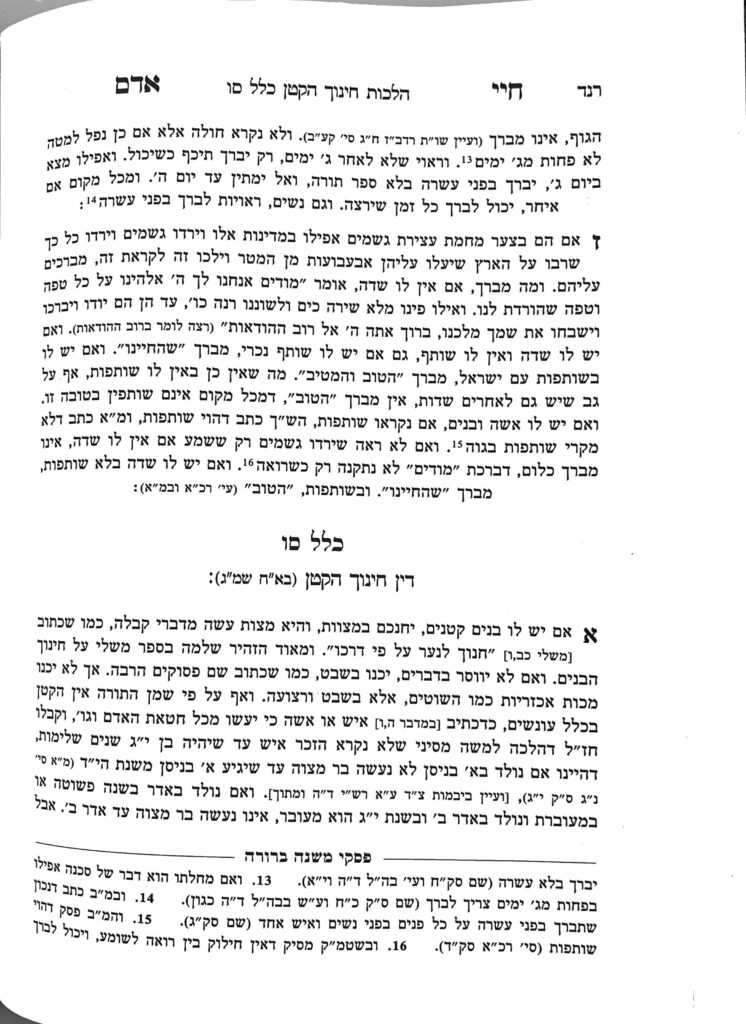We are beginning siman 7. The Gemara in Brachos, daf 57, tells us that Chazal instituted a birchas hodaah for rain. The Chayei Adam will discuss this bracha.
The Chayei Adam writes that if there is a dry season which has caused tzaar to the populace, one recites a bracha when it rains again. Even if the tzaar only becomes apparent close to the beginning of the next rainy season, one would still recite this bracha.
If it has rained even just a few times during the season, the bracha does not apply.
The bracha applies both in Eretz Yisroel and in chutz laaretz.
In order to recite the bracha, it must rain enough that the ground has become saturated to the point that when the raindrops hit the ground, they “cause the rain to pucker up towards the new rain” (i.e., there is some level of saturation).
If one does not have a field, they recite מודים אנחנו לך ה’ אלהינו על כל טפה וטפה שהורדת לנו ואלו פינו מלא שירה כים ולשוננו רנה. They then recite the continuation of Nishmas until הן הם יודו ויברכו וישבחו את שמך מלכנו. They end with the bracha, ברוך אתה ה, קל רוב ההודאות.
If one owns a field privately, or in partnership with a non-Jew, they recite shehecheyanu.
If one owns a field in partnership with a Jew, they recite hatov vehametiv.
The argument could be made that even a person who owns a field privately or with a non-Jew should recite hatov vehametiv, because the rain benefits many people. However, since each landowner benefits from the rain on their field independently, shehecheyanu is recited. However, if a private owner has a family, the Shach holds that the family is considered partners in the field, and so the landowner would recite hatov vehametiv. Although others hold that family are not considered partners, the Mishnah Berurah paskens in accordance with the Shach.
If a person was not present when it rained, if they do not own a field, they cannot recite their respective bracha (modim), because that bracha was instituted over the excitement and gratitude of experiencing the rainfall. However, if one owns a field, they still recite their respective bracha (shehecheyanu or hatov vehametiv), because the bracha is made on the benefit accrued, and the benefit exists regardless of whether the owner witnessed the rain.
This shiur culminates over 600 shiurim on hilchos brachos and tefillos. Mazel tov! Be’ezras Hashem, we will begin halachos of chinuch in the upcoming shiur.
Summary
- If there is a lack of rain which has caused tzaar to the populace, when it does rain, they recite a special bracha:
- If one does not own a field, they recite מודים אנחנו לך ה’ אלהינו על כל טפה וטפה שהורדת לנו ואלו פינו מלא שירה כים ולשוננו רנה. They then recite the continuation of Nishmas until הן הם יודו ויברכו וישבחו את שמך מלכנו. They end with the bracha, ברוך אתה ה, קל רוב ההודאות. They must witness the rainfall to recite the bracha.
- If one owns a field privately, or in partnership with a non-Jew, they recite shehecheyanu. They may recite the bracha even if they do not witness the rainfall.
- If one owns a field in partnership with a Jew, or has a family, they recite hatov vehametiv. They may recite the bracha even if they do not witness the rainfall.
- If it has rained even minimally during the season, one does not recite the bracha.
- In order to recite the bracha, the rainfall must be significant enough to cause enough saturation that subsequent raindrops cause a ripple upon landing.
- The bracha applies both in Eretz Yisroel and chutz laaretz.



